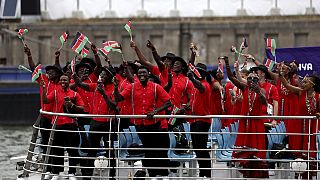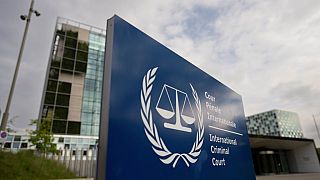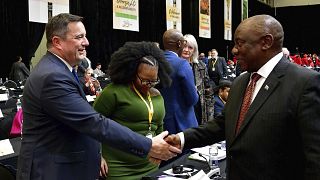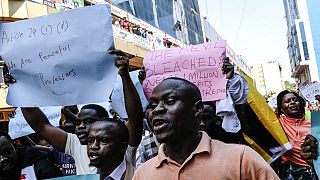Nigeria
Prolonged fighting in Nigeria between farmers and herdsmen is becoming more deadly.
Thirty three people were killed in Runji village in the north when raiders attacked in March.
Most of the victims were related and were either burned alive or shot dead in the attack in Runji.
The agrarian village is tucked 140 kilometres (87 miles) south of Kaduna, the capital of Kaduna state.
Since then, many people have been killed, including 100 in nearby Plateau State.
The attacks are emblematic of the security crisis in the northwest and central regions of the West African nation.
Victims from the Runji raid are still in hospital, recovering from their injuries.
Nine-month-old Christian Jonathan’s mother was shot dead as she fled with him in her arms.
They then cut off his finger and abandoned him by the road with a bullet wound in his tiny leg, his father says.
The decades-long violence between nomadic cattle herders and farming communities is becoming more deadly.
At least 2,600 people were killed in 2021, according to the Armed Conflict Location & Event Data Project.
Once armed with sticks, the groups now fight with guns that have been smuggled into the country.
Both sides accuse the government of injustice and marginalisation.
But the clashes have also taken on a religious dimension.
The violence has given rise to militias that side with the herders, who are primarily Muslim, or the farmers from Christian communities.
Arrests in the attacks are rare and usually take a long time.
It has prompted a growing number of communities already feeling a sense of siege to become desperate for self-defence.
On the other side of the conflict, the herders say they are also under attack.
They complain of cattle rustling and extra-judicial killings by local security groups working as community vigilantes.
The growing security crisis presents a huge challenge for Nigeria’s incoming president, Bola Tinubu.
He rose to power on promises of improving the living conditions of communities whose lives have been impacted by the violence.
He also promised to address the root causes of the crisis by providing jobs and ensuring justice.
Tinubu's inauguration is scheduled for Monday.
If the violence isn't reigned in, analysts say it could destablize the country and drive more of its 216 million people further into poverty.











02:31
Cholera outbreak: Medical experts, government move to curb spread
11:10
Morocco under Mohammed VI : A model of African progress? [Business Africa]
00:58
UAE lifts 2022 visa ban on Nigerians
00:46
Nigerian court says it will begin hearing Binance tax evasion case in October
02:20
Abuja Dance and arts festival 2024
02:26
Nigerians still grapple with unrelenting power shortages